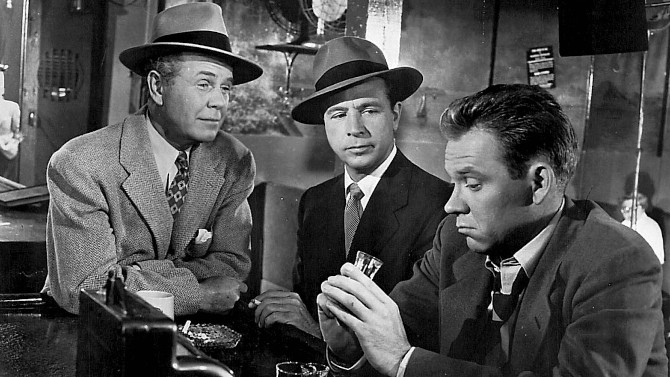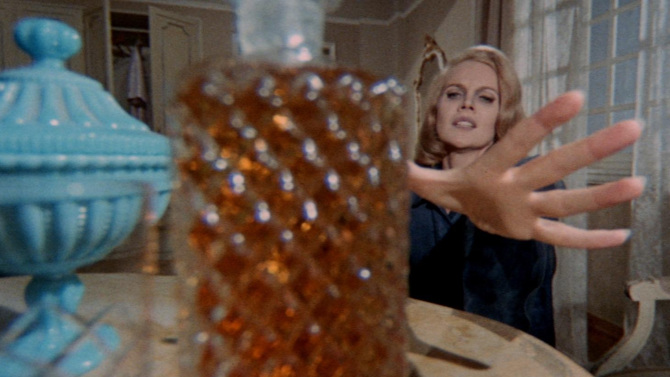
An Attaché Case
In 2025, dare I say that it’s nice to be highlighting a film made for mature audiences. Avoiding the pratfalls of sequels, remakes, comic book movies, and overly costly bombast, Black Bag, written by David Koepp (Mission: Impossible) and directed by Steven Soderbergh (Traffic), is most easily described as an old school spycraft feature. Opening with an extended tracking shot of spy George Woodhouse (Michael Fassbender) making his way through a happening nightclub in London, his contact soon informs him that there is a rat leaking some sort of tech software named Severus from within the agency. If there is one thing Woodhouse despises, it’s a liar, so he invites all of the suspects to a dinner party to try to get to the bottom of it.
-

An Attaché Case
Black BagMarch 18, 2025In 2025, dare I say that it’s nice to be highlighting a film made for mature audiences. Avoiding the pratfalls of sequels, remakes, comic book movies, and overly costly bombast, Black Bag, written by David Koepp (Mission: Impossible) and directed by Steven Soderbergh (Traffic), is most easily described as an old school spycraft feature. Opening with an extended tracking shot of spy George Woodhouse (Michael Fassbender) making his way through a happening nightclub in London, his contact soon informs him that there is a rat leaking some sort of tech software named Severus from within the agency. If there is one thing Woodhouse despises, it’s a liar, so he invites all of the suspects to a dinner party to try to get to the bottom of it.
-

Eggistentialism
Death Laid an EggMarch 14, 2025There is no denying that gialli can be a bit out there. These Italian twisty murder mysteries can often combine abstract writing, new age technologies of the 1960s and 70s, and some sex and drugs to make for a trippy experience... but you ain’t seen nothing yet. The most surrealist giallo of them all might just be 1968's Death Laid an Egg, directed by Giulio Questi. Welcome to the most posh chicken farm you’ll ever see. With a scientist (Biagio Pelligra) working nearly around the clock to genetically produce a new form of poultry that will almost instantly fatten with limited bone structure... all while countless chickens are being prepared for market by some new fangled automated technology, wife Anna (Gina Lollobrigida) and her secretary cousin Gabrielle (Ewa Aulin) lounge around their resort-like swimming pool as the former’s hubby, Marco (Jean-Louis Trintignant), gets his kinky rocks off with prostitutes at a hotel as he falls deeper and deeper into a fugue state.
-

Me and My Shadow
The Man Who Haunted HimselfFebruary 5, 2025The movie Roger Moore made directly before taking over the iconic role of James Bond for over a decade starting in 1973, The Man Who Haunted Himself (1970), co-adapted and directed by Basil Dearden from the novel “The Strange Case of Mr Pelham by Anthony Armstrong, is perhaps as un-Bond-like as possible (despite Moore uttering the quote above), which may be why the star also frequently suggested that this was his best film. Harold Pelham (Moore) is in a high stress position at a marine technology company – in which a merger is being pressured from an outside company, which, when combined with his rather awkward version of a stiff upper lip attitude, has left his marriage with Eve (Hildegarde Neil) rather cool and aloof.
-

Amateur Dick
Cry DangerNovember 4, 2024If jailed for false pretenses, when you finally get out of prison, what would you do? The premise of the engaging film noir thriller Cry Danger (1951), made by former child star and first time director Robert Parrish (it is also said Dick Powell was quite involved in the film’s directing), one thing’s for sure, it’s about as hard boiled as you can get. Dick Powell (Murder, My Sweet) plays understandably rough around the edges Rocky Mulloy – a man who was falsely fingered in an armed robbery case that led to a murder.
-

Paranoia, The Destroyer
OrgasmoSeptember 18, 2024You know you’re in the swinging sixties circa 1969 when the powers that be override the director and change the title of the film in its native Italy from Paranoia to Orgasmo. Keeping the original title for the American release, this Umberto Lenzi directed and Carroll Baker starring giallo becomes all the more confounding when considering that the film maker’s next feature also stars the same leading lady... and it is decided that it will be called Paranoia – leading to much confusion to this very day. The first of four movies the pair would make together in just a short four year period (all of which are reviewed on Filmizon.com), Orgasmo (aka Paranoia) follows seven week widowed alcoholic American socialite Kathryn West (Baker) as she flees the media attention in her native country, settling in picturesque Italy – where her lawyer (who also manages all of her assets), Brian Sanders (Tino Carraro), has found her a relaxing villa to stay in.
-

Blind Alley
Nightmare AlleyNovember 28, 2023Guillermo del Toro’s first foray into the realm of film noir, 2021's Nightmare Alley brings all of the Golden Age classic charm of the Studio System along with a classic pulpy story (based off of the novel of the same name by William Lindsay Gresham... as well as the 1947 movie adaptation), which is then fused with his own unique visual style. Following Stanton Carlisle (Bradley Cooper), a drifter, or is it grifter (after all, this is a neo-noir), with a dark past, he aimlessly stumbles upon a traveling carnival... taking a day’s work, he soon after accepts an offer from owner Clem Hoatley (Willem Dafoe) to join the team – seeing it as the perfect way to disappear from his secret history.
